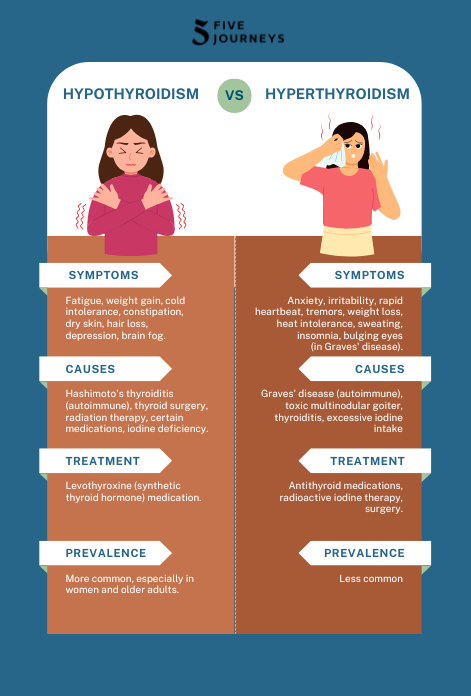Hyperthyroidism Treatment

Are you experiencing a racing heart, sudden weight loss, or feeling constantly on edge? These could be signs of hyperthyroidism, a condition where your thyroid gland produces too much thyroid hormone. While the symptoms can be unsettling, there’s no need to worry. At Five Journeys, we offer a comprehensive approach to hyperthyroidism treatment, combining conventional medicine with natural therapies to help you regain balance and reclaim your well-being. We understand the impact hyperthyroidism can have on your life, and we’re here to support you on your path to recovery.
What is Hyperthyroidism?
Hyperthyroidism, also known as an overactive thyroid, occurs when your thyroid gland goes into overdrive, producing more hormones than your body needs. These hormones play a vital role in regulating your metabolism, which affects energy production, heart rate, and body temperature. When your thyroid is overactive, it can accelerate your metabolism and lead to a cascade of symptoms that disrupt your daily life. Seeking hyperthyroidism help and finding a personalized treatment plan is essential for restoring balance and well-being.
What Causes Hyperthyroid Disease?
Several factors can contribute to the development of hyperthyroidism. Some common causes include:
Thyroid Nodules
Thyroid nodules are lumps that develop in the thyroid gland. While most nodules are benign (non-cancerous), some can become overactive and produce excess thyroid hormone, leading to hyperthyroidism.
Excessive Iodine Consumption
Iodine is an essential mineral for thyroid hormone production. However, consuming too much iodine can overstimulate the thyroid gland and lead to hyperthyroidism.
Thyroid Hormone Overmedication
Taking too much thyroid hormone medication can also cause hyperthyroidism. This is why it’s crucial to follow your doctor’s instructions carefully and have your thyroid hormone levels monitored regularly.
Thyroid Cancer
In rare cases, thyroid cancer can cause hyperthyroidism. Cancerous cells in the thyroid gland can sometimes produce excess thyroid hormone, leading to an overactive thyroid.
Genetic Predisposition
A family history of thyroid disease can increase your risk of developing hyperthyroidism. If you have close relatives with thyroid conditions, it’s important to be aware of the potential signs and symptoms.
Interested in Hyperthyroidism Treatment? Ask your provider or book a call with us!
Hyperthyroidism Symptoms
Hyperthyroidism can manifest in various ways, and the symptoms often develop gradually. It’s important to pay attention to any changes in your body and seek medical advice if you suspect you might have an overactive thyroid.
Unintended Weight Loss
Despite having a normal appetite or even an increased appetite, you may experience unexplained weight loss. This is because the accelerated metabolism associated with hyperthyroidism can burn calories at a faster rate.
Rapid or Irregular Heartbeat
A racing heart, also known as tachycardia, or an irregular heartbeat, also known as arrhythmia, can be a concerning symptom of hyperthyroidism. The excess thyroid hormone can stimulate the heart, leading to palpitations or a feeling of your heart pounding in your chest.
Nervousness, Anxiety, and Irritability
Feeling restless, anxious, or irritable can be common in hyperthyroidism. The overactive thyroid can affect your nervous system, leading to mood swings, difficulty concentrating, and increased sensitivity to stress.
Shaking Hands
Tremors or trembling hands are another potential symptom of hyperthyroidism. The excess thyroid hormone can affect your muscles, causing involuntary shaking, especially in your hands.
Remember that these are just some of the common symptoms of hyperthyroidism. If you’re experiencing any combination of these symptoms or even subtle changes that you can’t quite explain, it’s important to consult with your healthcare provider. They can perform the necessary tests and assessments to determine if you have hyperthyroidism and recommend an appropriate treatment plan.
Lifestyle Changes and Self-Care
While medical treatment is essential for managing hyperthyroidism, lifestyle changes and self-care practices are also vital components of a comprehensive treatment plan. The American Thyroid Association and American Association of Clinical Endocrinologists guidelines emphasize the importance of supportive care in managing hyperthyroidism and improving overall well-being. Here are some ways you can actively participate in your recovery:- Prioritizing sleep: Aim for 7-9 hours of quality sleep each night to support your overall health and hormone balance. Hyperthyroidism can disrupt sleep patterns, so creating a relaxing bedtime routine and optimizing your sleep environment can be especially beneficial.
- Managing stress: The ATA/AACE guidelines specifically recommend stress management techniques to help regulate your nervous system and reduce hyperthyroid symptoms. At Five Journeys, we offer various stress reduction techniques, including mindfulness practices, meditation, and yoga, to support your overall well-being.
- Nourishing your body: Focus on a balanced diet rich in whole foods, including fruits, vegetables, lean protein, and healthy fats. Proper nutrition provides your body with the building blocks it needs to function optimally and supports your thyroid health.

At Five Journeys, we believe in an integrative approach, combining the best of conventional medicine with evidence-based natural therapies.
Benefits of Early Overactive Thyroid Treatment
Addressing hyperthyroidism promptly can significantly improve your overall health and well-being. Here are some of the benefits of early intervention:
Stabilizes Heart Rate and Blood Pressure
Hyperthyroidism can put a strain on your cardiovascular system, potentially leading to complications like high blood pressure, rapid heart rate, and even heart failure. Early treatment can help regulate your heart rate and blood pressure, reducing the risk of these complications.
Protects Bone Health
Hyperthyroidism can accelerate bone loss and increase the risk of osteoporosis and fractures. Early intervention and effective management of hyperthyroidism can help protect your bone health and reduce the risk of these complications.
Prevents Muscle Weakness and Fatigue
Muscle weakness and fatigue can be debilitating symptoms of hyperthyroidism. By addressing the underlying hormonal imbalance, you can restore muscle strength and improve your energy levels.
Reduces Anxiety, Nervousness, and Irritability
Treating hyperthyroidism can help calm your nervous system, reducing anxiety, nervousness, and irritability. This can lead to improved mood, better sleep, and a greater sense of well-being.
Improves Sleep Quality
Hyperthyroidism can disrupt your sleep patterns, causing insomnia and difficulty falling or staying asleep. Treating the condition can help restore healthy sleep patterns, allowing you to get the restful sleep you need.
Helps Maintain a Healthy Weight
Unintended weight loss associated with hyperthyroidism can be concerning. Early treatment can help stabilize your metabolism and make it easier to maintain a healthy weight.
Natural Ways to Cure Hyperthyroidism
Many people seek natural ways to cure hyperthyroidism or find a cure for hyperthyroidism. While conventional treatment with medication is often necessary, certain natural therapies may offer additional support. At Five Journeys, we explore various options, including:
- Dietary changes: Identifying and addressing potential food sensitivities or deficiencies that may be contributing to your thyroid condition.
- Herbal remedies: Exploring the potential benefits of certain herbs and supplements known to support thyroid function.
- Stress management techniques: Incorporating practices like mindfulness and meditation to reduce stress, can impact thyroid health.
It’s important to note that natural therapies should be used in conjunction with, not as a replacement for, conventional medical treatment. Our team will work with you to develop a personalized plan that combines the best of both worlds.
Why Improve Your Health With Five Journeys?
At Five Journeys, we understand the challenges of living with hyperthyroidism. Our team of experienced practitioners is dedicated to providing compassionate, individualized care that empowers you to take control of your health. Here’s why you should consider partnering with us on your journey to wellness:
Holistic Approach
At Five Journeys, we recognize that true wellness encompasses more than just physical health. We take a holistic approach that considers all aspects of your well-being, including physical, emotional, mental, and spiritual health.
Personalized Care
We understand that each individual is unique, and their health needs are different. That's why we tailor our services to meet your specific needs and goals. Whether you're seeking preventive care, managing chronic conditions, or optimizing your overall health, we provide personalized solutions that prioritize your well-being.
Insurance Accepted
If you’re seeking hyperthyroidism natural treatment or a holistic treatment for hyperthyroidism, Five Journeys offers a unique and supportive approach. We believe in the power of combining conventional medicine with natural therapies to help you achieve optimal health and well-being. Don’t let hyperthyroidism hold you back any longer. Schedule a consultation today in Boston and Newton and discover how we can help you reclaim your vitality and live your best life.
*Massachusetts law does not allow us to accept MassHealth & Medicaid. Other exceptions may apply.
References
- Prisant, L. M., Gujral, J. S., & Mulloy, A. L. (2006). Hyperthyroidism: A Secondary Cause of Isolated Systolic Hypertension. The Journal of Clinical Hypertension, 8(8), 596–599. https://doi.org/10.1111/j.1524-6175.2006.05180.x
- Gorka, J., Taylor-Gjevre, R. M., & Arnason, T. (2013). Metabolic and Clinical Consequences of Hyperthyroidism on Bone Density. International Journal of Endocrinology, 2013, 638727. https://doi.org/10.1155/2013/638727
- Bahn, R. S., Burch, H. B., Cooper, D. S., Garber, J. R., Greenlee, M. C., Klein, I.,… & Stan, M. N. (2011). Hyperthyroidism and Other Causes of Thyrotoxicosis: Management Guidelines of the American Thyroid Association and American Association of Clinical Endocrinologists. 1 Thyroid, 21(6), 593–646. https://doi.org/10.1089/thy.2010.0417
Why we do, What we do...






























